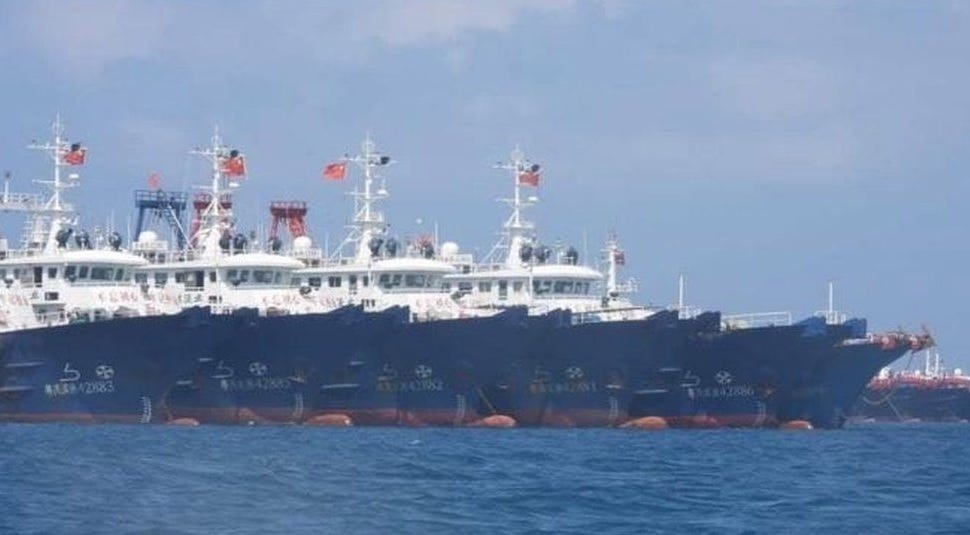[ad_1]

Almost five years after Philippine President Rodrigo Duterte chose to give away his nation’s 2016 victory at the Court of Arbitration to China over control of the South China Sea in return for promises of huge investments, China has shown its gratitude: a swarming attack by some 220 vessels billed as fishing boats on Whitsun reef. The reef, which barely rises above sea level, lies 175 miles west of Palawan Island and well within the Philippines’ 200 nautical mile Exclusive Economic Zone.
In practice, this was simply a raw power exercise by China as part of its imperialist claim to almost the whole of the sea, known variously to others as the West Philippines Sea, the East Sea, and the North Natuna Sea. Defense Minister Delfin Lorenzana’s office said the fishing boats did not appear to be fishing and were rather crewed by members of China’s maritime militia, a humiliating demonstration of crude power in answer to Duterte’s professions of friendship with China.
China’s claim to almost all of the South China Sea was unanimously rejected by the Court of Arbitration which further accused China of illegal fishing and environmental destruction. But for Beijing, nothing can stand in the way of the “superior” Han people and their assumption that their southern neighbors owe it tribute. Beijing refused to enter the proceedings and ignored the verdict.
The Armed Forces of the Philippines (AFP) were aghast at this latest development, their surveillance aircraft recording the Chinese presence on March 7. But it wasn’t until three weeks later that the news was released. The invasion elicited a modestly-worded complaint from the Philippine Foreign Secretary Teodoro Locsin.
Presidential spokesperson Harry Roque appeared nonchalant about the situation, saying it was unlikely to develop into a standoff with China like that over Scarborough (Panatag) shoal nine years ago because “we have a close friendship with China.”
This was an admission that the nation would do nothing to defend itself – unlike over Panatag where it stood its ground until fooled into a mutual US-backed withdrawal agreement which China immediately reneged on. Philippine unwillingness ever to put up a fight does not impress its friends and neighbors, who see most of its military efforts aimed at its own citizens, whether Muslim or Communist insurgents or, most recently, eliminating some of those leftist and peasant organizers “red-tagged” by Duterte’s people.
Needless to say, this time the Chinese denied they were up to anything unusual, claiming the ships were mere fishing vessels sheltering from rough seas.
The Chinese choice of Whitsun as a target may also be connected to its location, which is not only within the Philippine EEZ but also not far from those of both Vietnam and Malaysia, countries which have so far made more effort to defend their sea territory.
The Duterte administration, beset by a year of misgovernment in the face of Covid-19 and with new cases reaching record levels near 8.000 overnight, is more concerned with securing supplies of Chinese vaccines than defending the country. The Philippines has received some 600,000 free from Sinovac and has a total of 25 million on order from the Chinese supplier. But this is a modest amount for a nation of 110 million.
A mixture of incompetence, corruption and the consequences of past misuse of the UN-sponsored Dengvaxia anti-dengue vaccine, in which 14 children died after being vaccinated, has meant that despite funds being set aside to fight Covid, the Philippines is far down the queue for supplies of anything other than Sinovac’s.
The Sinovac product, which has yet to be approved by the World Health Organization, is not recommended, even in China, for those over 60, and also has a much lower success rate than others such as Pfizer Biotech, Astra Zeneca, and Moderna. The Philippine military is said to be dragging feet over the use of Sinovac.
An expected shipment of 525,600 doses of the AstraZeneca-Oxford University vaccine has been postponed due to supply problems. At the moment, with a virile new strain detected, parts of the Philippines on the main island of Luzon on March 21 were placed under an “absolute quarantine period” to last until at least April 4. With only rudimentary tracking and tracing, Duterte continues to put all his eggs in the quarantine basket. Overnight, total cases had reached more than 656,000, with nearly 13,000 dead, both figures the highest in Southeast Asia behind Indonesia.
Duterte’s “friendship” with China has thus bought him precious little other than 220 fishing boats in his waters near Palawan. It appears to be a friendship that extends one way – to the north.
This article is among the stories we choose to make widely available. If you wish to get the full Asia Sentinel experience and access more exclusive content, please do subscribe to us.
[ad_2]
Source link